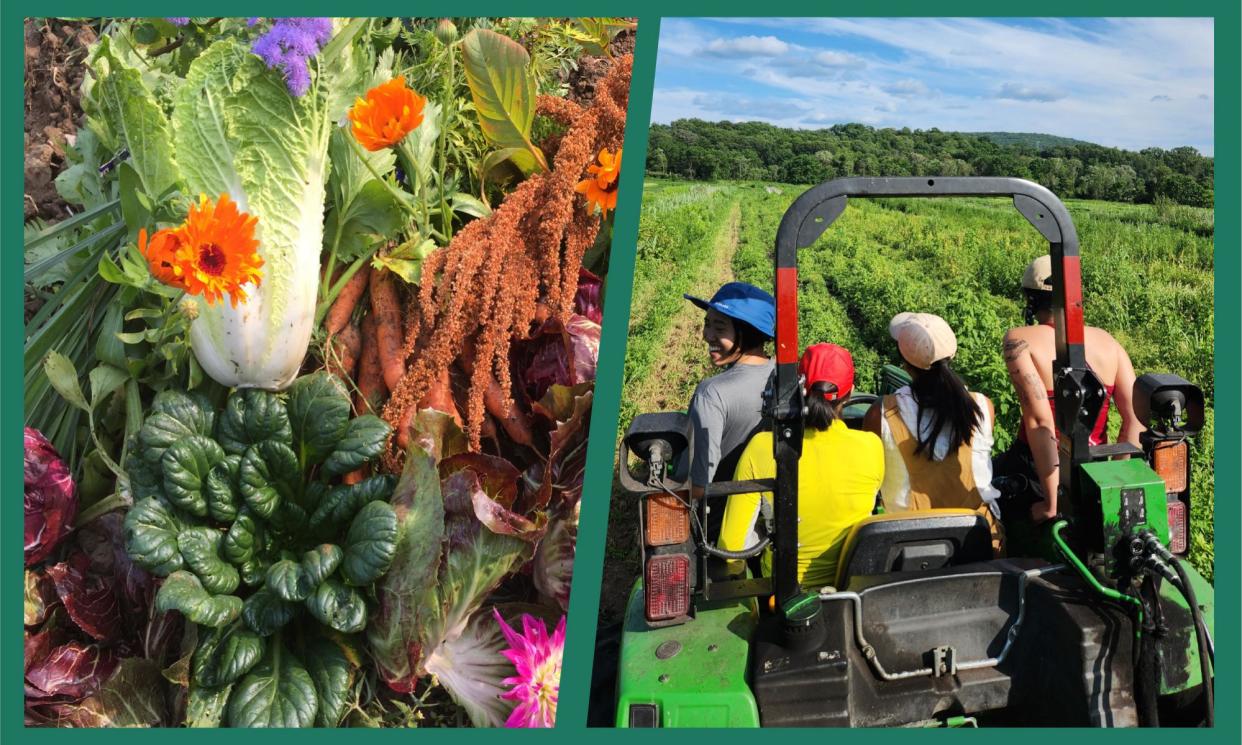Asian American farm collective targets food insecurity: ‘It’s been really healing’

Every Wednesday afternoon, seniors, community groups and restaurants across Manhattan Chinatown receive boxes of freshly grown Asian heirloom vegetables – it could be cabbage, Thai basil, bitter melon, chili peppers, okra or green stem cauliflower, depending on the season. The produce was grown by a small group of Asian American farmers upstate who are on a mission to make these staples more affordable and accessible for their own communities.
“I want our food to go to people who would really love it, but would not have access to it without money,” said Amanda Wong, a 34-year-old farmer and co-owner of Star Route Farm in Charlotteville, New York. She’s part of a collective of Asian American farmers in the Hudson Valley region known as Choy Commons, which grows ancestral foods and then works with mutual aid groups to distribute them, often for free, among the Asian American community.
By connecting Asian American communities with Asian-owned small-scale farms, Wong says Choy Commons is building a new kind of supply chain “from the ground up”.
Asian Americans in particular are in need of this new kind of food chain. The poverty rate among Asian Americans in the New York metro region has been climbing in recent years; now more than 10% of those living in poverty in the area are Asian American. Many of them are food insecure and rely on nonprofits and mutual aid groups for their meals, but culturally appropriate food – especially fresh produce – is often hard to come by at food banks and pantries in the city.
Founded in 2021 at the height of the pandemic, Choy Commons is trying to fill those gaps. Through its wholesale program, Choy Commons sells much of its produce to on-the-ground community groups, who then in turn distribute the foods to needy individuals.
“We’re helping build these farmers’ businesses, but also building our communities at the same time,” said Larry Tse, a 33-year-old organizer with Choy Commons. “You’re not going to see that with [other] distributors. This is really creating a distribution channel with a social mission.”
At the same time, the collective is, in a way, reviving the agricultural legacy of Asians in the US, and providing a much-needed space for Asian American farmers to support each other.
Prior to World War II, Japanese American farmers in California once produced 40% of all commercial vegetables in the state. But discriminatory laws, as well as the incarceration of Japanese Americans during the war, led to significant land loss and a decline in the number of Asian-led farms. Today, Asian Americans comprise just 1% of all farmers across the US.
When Wong, of Star Route Farm, started her career as a grower 10 years ago, it was a somewhat lonely endeavor. As an Asian American farmer in a predominantly white farming community in upstate New York, she felt disconnected from the food she was growing and the people it was going to. But joining Choy Commons changed everything for her.
“We can work together in this way where we don’t have to explain cultural differences,” said Wong. “We can bond over suffering and share resources. It’s just been really healing.”
This year, in addition to the wholesale program with Choy Commons, she’s also bringing produce directly to schools in Sunset Park and Chinatown.
Nicole Yeo-Solano, a 34-year-old Chinese American organizer with Choy Commons, said the group has been grappling with the question of what it means to be an Asian American farmer.
“Answering that together in community has been one of the most beautiful experiences of my life. I think Asian Americans have not really understood with as much clarity what our history is and what our role has been, aside from the ‘model minority,’” she said in reference to the pervasive stereotype that all Asian Americans are hardworking, well-educated and successful.
Choy Commons also runs a variety of cultural programs throughout the year, to teach other Asian Americans about ancestral food ways and growing traditions. Last fall, the group hosted a kimjang, a traditional Korean process of preparing and serving kimchi.
They’re hoping that some of this work will encourage others to try farming.
“We do our best to create that space for people who might want to go into agriculture or land-based work to come and experiment and see how that feels,” said Christina Chan, 35, a co-founder of Choy Commons and the owner of Choy Division farm.
One of Choy Commons’ most meaningful programs, several of the farmers said, was bringing seniors from New York City to their farms to see how the produce they receive each week is being grown. Some of the seniors had never left New York City since they immigrated to the US, let alone had the chance to see Asian heirloom crops being grown on American soil.
“You can just see the joy in the elders’ faces when they see green stem cauliflower being grown for the first time and telling us how they used to grow it back in China,” Tse said.
As Choy Commons enters its third season, Wong says much of the group’s success is due to hard work and resilience – but she can’t help but feel there’s something bigger behind them.
“We’re a group of Asian farmers who do this to connect to our heritage, our homeland and our ancestors,” she said. “It’s such an offering to our people and the history that we are disconnected from. With the luck we faced last year, I think it’s ancestral power, like all of our ancestors coming to tell us that we’re doing the right thing and that we can succeed as a group.”


